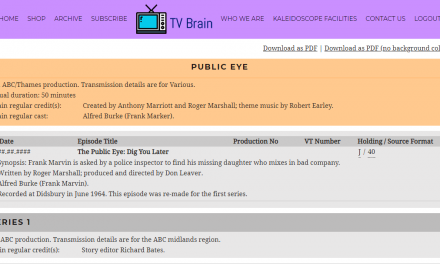After the spectacle and drama of live television during an obsessive month of watching the Olympics and Paralympics, the television schedules began to turn to something like normal in the beginning of September and it became clear that new drama was being pushed as a main selling point. The BBC advertised its ‘New Original British drama’ with clips from six dramas set in the UK, while also featuring the period adaptation Parade’s End as an early high point of the Autumn. Meantime and more surprisingly, perhaps, we were being told on another channel we were being told that ‘Drama Lives on ITV’. Not only was Downton Abbey returning for series three but there was a Ronnie Biggs biopic Mrs Biggs, Tony Marchant’s three-part Leaving (now waiting on my TiVo box), four young women using their decoding skills in The Bletchley Circle and A Mother’s Son, with Hermione Norris and Martin Clunes. And The Last Weekend, a three part drama based on a Blake Morrison which actually turned out to be good – a psychological thriller driven on by an on-screen voiceover as the sinister Ian (Shaun Evans) tried to take the audience into his confidence.
high point of the Autumn. Meantime and more surprisingly, perhaps, we were being told on another channel we were being told that ‘Drama Lives on ITV’. Not only was Downton Abbey returning for series three but there was a Ronnie Biggs biopic Mrs Biggs, Tony Marchant’s three-part Leaving (now waiting on my TiVo box), four young women using their decoding skills in The Bletchley Circle and A Mother’s Son, with Hermione Norris and Martin Clunes. And The Last Weekend, a three part drama based on a Blake Morrison which actually turned out to be good – a psychological thriller driven on by an on-screen voiceover as the sinister Ian (Shaun Evans) tried to take the audience into his confidence.
ITV Trailer available HERE.
So it was less of a surprise to discover, when I caught up with the Paula Milne season at the BFI on the South Bank, that Thursday 12th, the drama I was going to see, had actually been scheduled by ITV. Originally commissioned by Channel 4, it was axed by them in the late 90s but was picked up by Carlton TV and twice scheduled for commission in the spring of 2001. But the screening did not go ahead and, according to the bfi, this was the first time this four episode drama had been seen in the UK (IMDb says differently). Thursday 12th centred on an aspirant politician, awaiting news as to whether he had been selected to stand as the Labour candidate in a parliamentary by-election and the character list also included his father, Edgar (Peter Vaughn), once a Labour whip, then a Lord, and now reduced to confused and frantic dementia of Alzheimers. The drama was meant to be screened in the spring of 2001 but its political context meant that it was deemed to fall within the domain of the Representation of the People Act and therefore could not be shown within six weeks of the local elections in May and the General Election in June. And after that, its moment had passed, although it has been screened with acclaim outside the UK.
Spread over four episodes, which looked as if they were designed to be screened over two nights, the story started with a news reporter outside the house of successful dentist and aspiring politican, Marius Bannister (Ciaran Hinds) at 12 midnight on Friday 13th. He tells us that a body of a family member has been found, that the death is suspicious and an arrest is imminent. After that the clock on the screen moves backwards and the episode starts with the 7am radio news of the previous day (Thursday 12th ) as the Bannister family begins to wake up. The first episode tells Marius’s story and the subsequent episodes each return to 7am that Thursday and tell the story by following Marius’s wife, Nina (Maria Doyle Kennedy), his sister-in-law, Candice (Elizabeth McGovern) and his teenage son Martin (Jim Sturgess). The episode tells the story of the day but also goes back to a previous Thursday 12th when the daughter of the family, 5 year-old Daisy drowned, leaving the family torn apart by guilt and grief. Each character’s story establishes the motive and means for a possible murder and in the end it is revealed that the murder happened by accident or at least the murderer got the wrong person.
 The plot is too complicated to go into here but this felt like a bold and touching drama by one of Britian most experienced television writers. Milne began her career writing for the ATV soap Crossroads and she devised the BBC’s hospital-based soap Angels (1975-83) which focused on the largely female nursing staff. She has written Plays for Today, Screen Two films and US-funded feature films as well as numerous series and adaptations, including Small Island and The Night Watch, both period dramas for the BBC. Most recently, earlier in 2012, BBC screened her series White Heat a serial in six parts which reflected on how life for the young changed in the 1960s. (An interview with Milne about this serial can be found HERE.)
The plot is too complicated to go into here but this felt like a bold and touching drama by one of Britian most experienced television writers. Milne began her career writing for the ATV soap Crossroads and she devised the BBC’s hospital-based soap Angels (1975-83) which focused on the largely female nursing staff. She has written Plays for Today, Screen Two films and US-funded feature films as well as numerous series and adaptations, including Small Island and The Night Watch, both period dramas for the BBC. Most recently, earlier in 2012, BBC screened her series White Heat a serial in six parts which reflected on how life for the young changed in the 1960s. (An interview with Milne about this serial can be found HERE.)

Like Thursday 12th, White Heat played around with time. Six friends return to the house they shared as students to clear it out after the death of the seventh. A brilliant cast included the older versions of the characters (played by Juliet Stephenson, Lindsay Duncan and Hugh Quarshie, among others ) in tamden with their younger selves (including Claire Foy, David Gyasi and Sam Claflin) and the stories of their politics, relationships and careers are gradually played out in the light of hindsight. But perhaps because of this, although Milne stressed the serial is partly based on her own experiences, the events and dilemmas which break the group up seem to be the rather hackneyed ones which always figure in representations of the 1960s – unwanted pregnancy, abortion, Vietnam marches, drugs, and student politics; women’s liberation breaks up relationships; mental illness was treated with electric shocks; parents were uncomprehending. It’s not that these things didn’t happen or were unimportant. It’s that the framework of characters looking back encouraged a sepia-hued view in which the Sixties was packaged and periodised for later eyes.
Thursday 12th seemed to be bolder, more melodramatic than nostalgic, less coherent but more engaging. Certainly, some of the plot devices were far-fetched and some of the repetitions required by the format were a bit laboured. But precisely because the audience was initially encouraged to treat the format as a game of who-dun-what-to-whom? there was a liveliness and energy about it which made you want to know more about the characters. They were telling their stories, not looking back on them, and the situation keep changing as alliances were revealed and scenes containing one or two characters turned out to have been overheard by others. Once the story-telling format really kicked in, with Nina’s episode, the potential for intriguing details and unexpected events was taken up very effectively; when, for instance, Nina escapes from her husband’s control for a while we expect her to find a pub for more of the vodka she takes to numb the pain but she ends up at her son’s therapist instead. The characters become more layered so that Nina, who in Marius’s episode performs her wifely duties as if coshed by alcohol, turns out in her own episode to be perfectly capable of organizing a charity event and, more bizarrely, setting up her husband’s affair with her sister and listening to their sexual activity on a baby-minding device. Peter Vaughn gives a brilliant performance as Marius’s father and, though he cannot tell his own story, the measure of the other characters is how they respond to him; Marius in his clumsy, frustrated but practical care shows how much he wishes for his father’s approbation and grandson Martin identifies with his grandfather’s fluctuating insights in his flawed attempt to help him die. Only the wicked Candice absolutely fails the test, shouting at the old man and knocking on Edgar’s forehead to test whether he has registered her over-seen preparations for murder. And even the flashback scenes of the lost Daisy in the swimming pool are charged with pain and guilt rather than loss and regret; the diffused lighting and colour cannot conceal that Daisy had been something of a spoilt brat.
Of course I saw all this in a cinema which could certainly affect the impact. This was not entirely to its advantage. I suspect that seeing it at one sitting meant that one became more aware of some of the repetitious moments, particularly in Candice’s episode since her character though played with evil relish lacked the complexity of the others. On the other hand, it was perhaps easier to catch at the overlapping nuances of a particular line or gesture as it was repeated from a different angle and, as sometimes happens, the unfussy visuals with the emphasis on close-ups actually work effectively in the dark on a bigger screen. Gradually the characterization and the moral dilemmas became as engaging as the plot.
Rumour has it that Thursday 12th will finally be shown on television in the UK soon. In the meantime, as the new term starts, some of her other work would certainly be worth adding to all those year 1 Television courses.
Christine Geraghty is an Honorary Professorial Fellow at the University of Glasgow and an Honorary Research Fellow at Goldsmiths, University of London. Her publications on television include a contribution to the 1981 BFI monograph on Coronation Street; Women and Soap Opera (Polity, 1991); and My Beautiful Laundrette (I B Taurus, 2004). Her BFI TV Classic on Bleak House (2005) will be published in October 2012. She is on the editorial board of the Journal of British Cinema and Television and sits on the advisory boards of a number of journals, including Screen.




